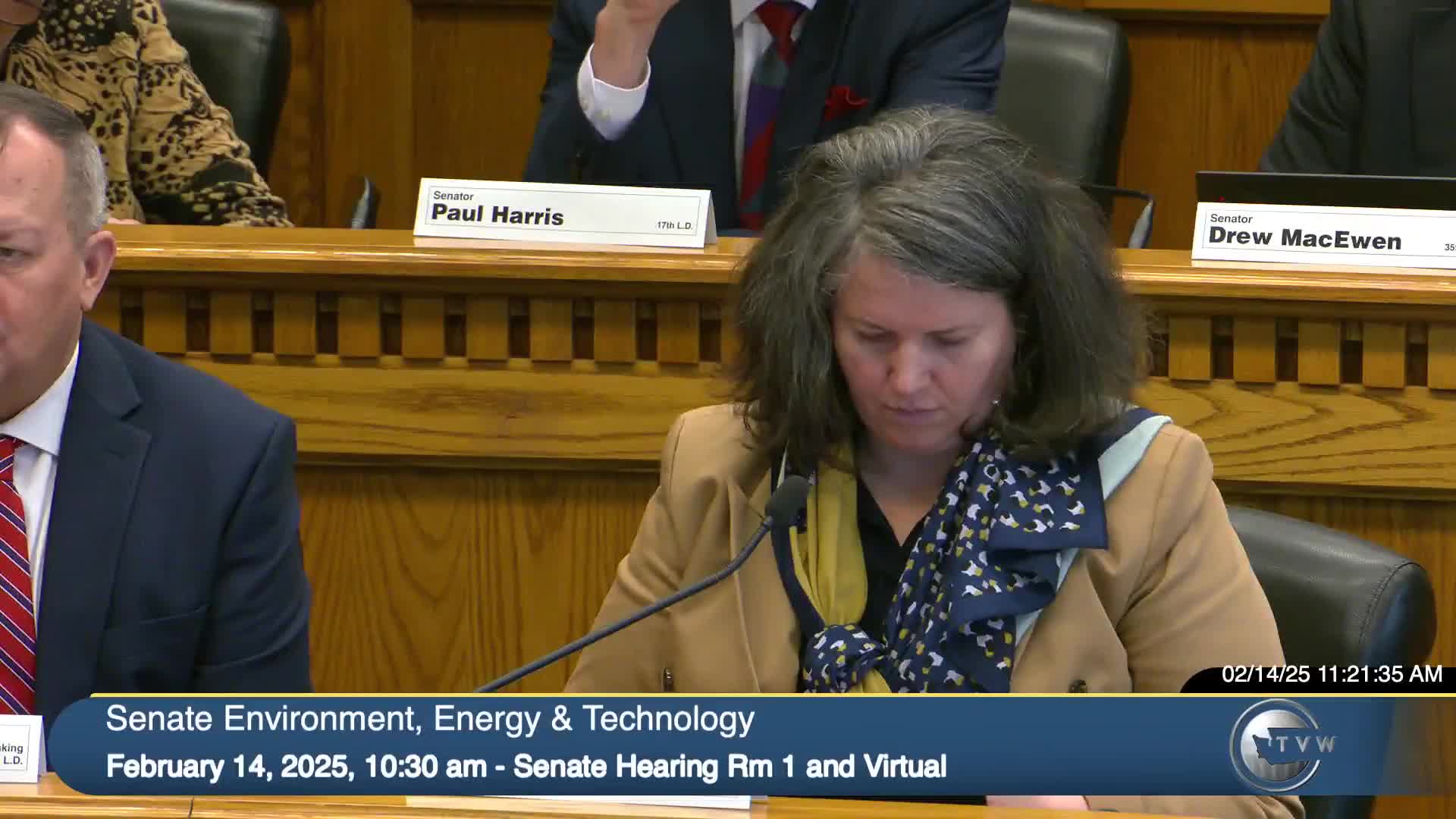Senate hearing on ‘Before You Dig’ bill draws broad support from contractors, utilities and safety advocates
Get AI-powered insights, summaries, and transcripts
Subscribe
Summary
Senate Bill 5627, a package of updates to Washington’s Underground Utility Damage Prevention Act, prompted broad testimony urging modernization of the 811 notification system, stronger positive-response practices, and clearer rules about on-site marking responsibilities.
Senate Bill 5627, which updates the state’s Underground Utility Damage Prevention Act (the state “call-before-you-dig” law), drew broad participation at a public hearing in front of the Senate Environment, Energy & Technology Committee. Sponsors and witnesses emphasized worker safety, more reliable locate responses, and modernizing the 811 process by adding a free, web-based mapping and ticketing platform.
Senator Bill Ramos, sponsor of SB 5627, said the bill “is trying to update, modernize it, move it into a web based program versus just a, you know, 1-800 number.” Committee staff detailed a package of changes that would require the one-number locator service to maintain a free web platform with digital mapping (staff: “the platform must be free and use digital mapping software permitting an excavator to mark the area on an electronic map and it must require the excavator to include a work to begin date”). If an excavator marks the area on that digital platform, they would not be required to also physically mark the ground, though staff noted physical markings would “take priority.”
Why it matters: Witnesses said timely and accurate locates improve worker safety and reduce project delays and costs. Testimony focused on three recurring concerns: (1) late locates that force contractors to delay or cancel work, (2) how multiple contractors on a single ticket will share responsibility for on‑site markings and updates, and (3) requirements and practical limits for locating or documenting “unlocatable” infrastructure.
What the bill would change (staff summary)
- Require the 1‑number locator service to provide a free web platform permitting excavators to mark the work area on a digital map and to include a work-begin date. Digital marking can substitute for physical white-lining, but physical markings would take priority. - Allow general contractors to provide notice on behalf of subcontractors; require excavators not to dig until all known facility operators have marked or provided sufficient information. - Require facility operators to provide reasonably accurate information by the work-to-begin date and to maintain records of abandoned or out-of-service lines beginning in 2026. - Expand the emergency exemption to include dangers to health and unplanned customer service outages, and create new misdemeanor violations and increased civil penalties in limited circumstances. Staff also reported an initial UTC estimate of roughly $520,000 of operating expenses for a related pipeline safety implementation in 2025–27 and 2027–29 biennia.
Public testimony highlights
- Don Evans, executive director of Washington 811, said the bill “will very much improve the damage prevention industry as well as behavior in the state,” and confirmed the call-before-you-dig service is historically funded by utility fees tied to tickets.
- Nick Massey, a general contractor, told the committee the proposal improves communication and worker safety and pressed that facility owners should be required to locate laterals that are currently marked as unlocatable: “This will also increase worker safety… We want our young and our workers to go home every night, free of that.”
- Charlie Brown of Cascade Natural Gas said his company supports modernizing and updating the dig law and is engaged in pilots testing certain provisions.
- Utilities including Avista and representatives of public utility districts registered concerns (signed in “con”) about specific provisions: Avista asked for clarity on multiple-excavator tickets and the operation and liability of digital white-lining; several utilities sought alignment with federal pipeline safety code for hazardous liquid and gas pipelines and raised due-process concerns regarding the safety committee and penalties.
- Contractors and dig advocacy groups emphasized “positive response” — a confirmation the locate was completed — as a key operational improvement. Witnesses said late locates remain a recurring problem (testimony described late locates “anywhere from 1 day to 30 days” in some busy months), and that positive response helps contractors decide whether to mobilize crews.
- Representatives of water and sewer districts and university utilities urged careful drafting for requirements to locate or maintain records on lines that are effectively unlocatable, noting older infrastructure (50–100 years old) poses technical and cost challenges.
Positions and next steps
Testimony came from a diverse set of stakeholders: emergency and worker-safety advocates, Washington 811, contractors, lobbyists for gas utilities, PUDs, municipalities, and statewide dig-safety advocates. Multiple groups said they were willing to continue negotiations; Avista and others asked for draft clarifying language on responsibility for maintaining markings and on how multiple excavators on one ticket would operate. Sponsors and proponents urged the committee to consider the bill as a modernization that balances equity for contractors with public and worker safety.
The hearing closed with no committee vote; committee staff and the sponsor signaled willingness to continue stakeholder discussions and technical fixes before the bill moves toward committee action.
